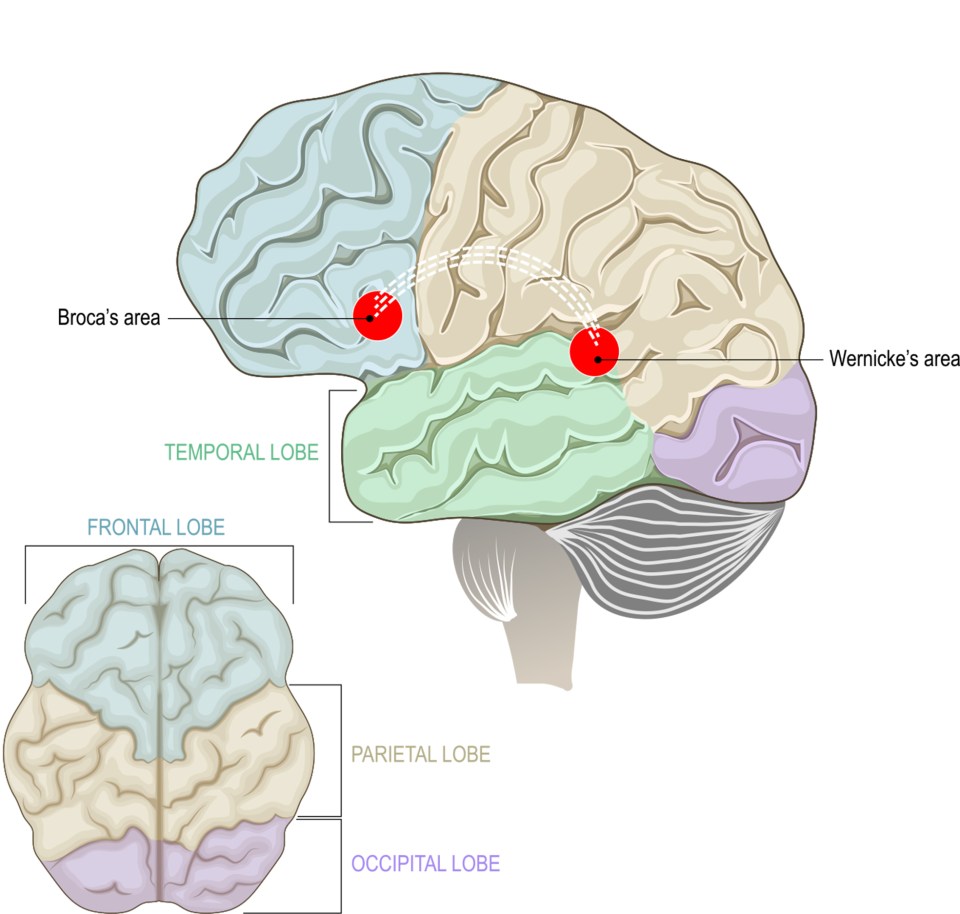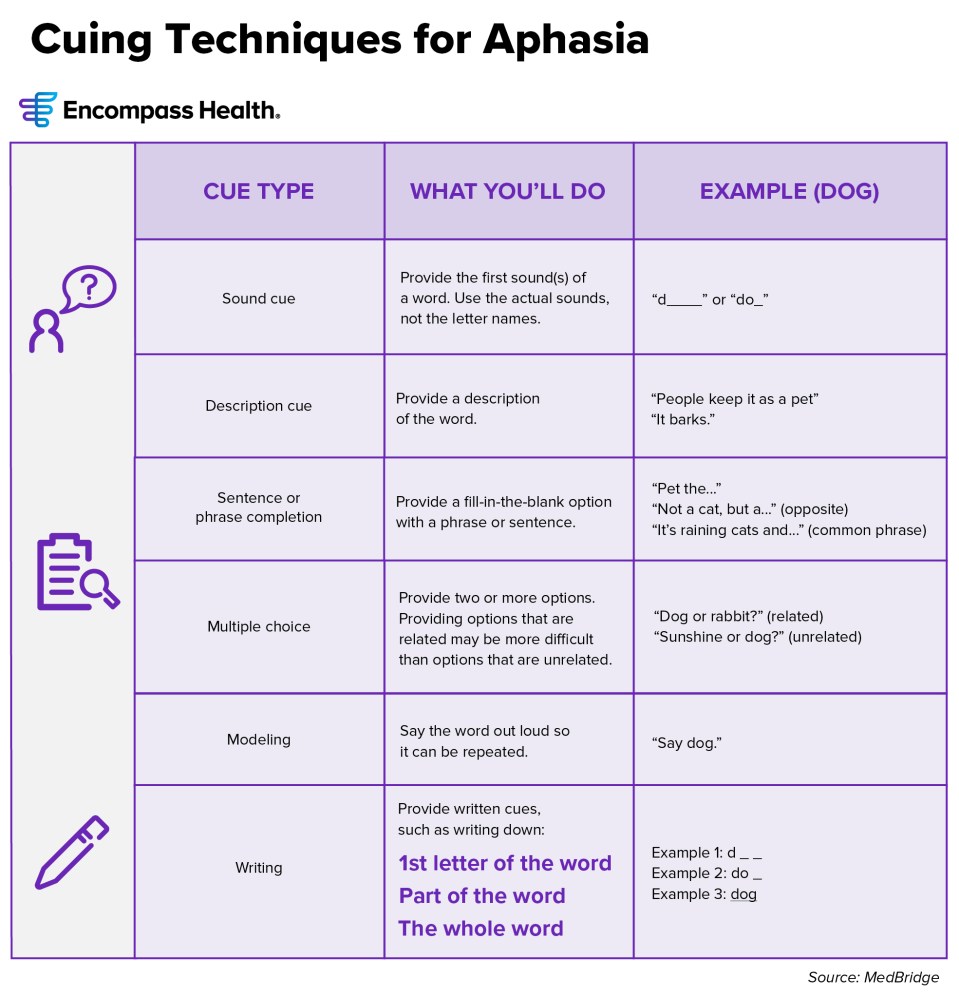Summary
Aphasia is a communication disorder resulting in the loss of ability to understand language, read, express speech or write. There are several different types of aphasia. It can range from being mild to severe.
These different types have different signs and symptoms, but one thing they share in common is they are caused by damage to the brain. Although language is affected, aphasia does not impact intelligence.
“Aphasia is a language deficit caused by an acquired injury,” said Stacy Thomashaw, director of therapy operations at Encompass Health Rehabilitation Hospital of Sunrise in Florida. “No matter the type, it’s always an acquired disorder like after a stroke or brain injury.”
Thomashaw is also a speech language pathologist and has worked closely with aphasia patients. She said treatment options vary depending on the patient and the type of aphasia, but the goal in inpatient rehabilitation is the same: to get patients functioning at their highest level possible.

The Main Types of Aphasia
The two broad categories of aphasia are known as fluent and nonfluent aphasia. Within these broad categories, there are eight forms of aphasia and many other possible combinations of deficits that do not fit into the exact aphasia categories.
Fluent aphasia is when a patient can produce speech that is connected but lacks meaning. Within these two broad categories, there are three common types of aphasia. Wernicke’s aphasia is a fluent aphasia. Broca’s aphasia is as non-fluent aphasia. Global aphasia is the most severe and is a combination of both fluent and nonfluent.
Broca’s Aphasia
Named after French scientist Paul Broca, Broca’s aphasia severely impacts speech. In this form of aphasia, the frontal lobe, which controls the functions linked to speech production, has been impacted.
Speaking is usually limited to just a few words. Individuals with Broca’s aphasia may have difficulty producing the right sounds.
Though, someone with Broca’s aphasia might not be able to speak well, they could still be able to understand what others are saying. They also may be able to read, but writing is challenging.
Symptoms may include:
- Speaking in short clipped sentences, typically less than four words
- Difficulty using verbs correctly
- Often understand others
- Halted speech that takes a lot of effort to string words together
Wernicke’s Aphasia
Named after the German neurologist Carl Wernicke, this type of aphasia impacts an individual’s ability to understand speech. However, they maintain the ability to talk fluently. Wernicke’s aphasia impacts the temporal lobe of the brain located on the left side. This area controls the ability to understand speech.
While individuals with this form of aphasia can speak in long sentences, often what they say doesn’t make sense.
Symptoms may include:
- Using made up or irrelevant words when talking
- Difficulty understanding what others are saying
- Sentences are linked together well but lack proper meaning
Global Aphasia
A combination of both Broca’s and Wernicke’s aphasia, global aphasia is the most serious. Individuals with global aphasia cannot speak fluently or understand speech. Like other forms of aphasia, they may still possess their other cognitive and intellectual capabilities.
This type of aphasia is caused by injuries to both the Broca and Wernicke areas of the brain and is typically seen immediately after a traumatic brain injury, stroke, brain tumor or other brain disorders that progress over time
Symptoms may include:
- Unable to speak fluently
- Difficulty understanding what others are saying
- Often cannot read or write

Download this chart to use later
Aphasia Treatment
All types of aphasia should be treated by a licensed speech language pathologist (SLP), and depending on the severity of the condition leading to the diagnosis, in an inpatient rehabilitation hospital.
Speech therapists cannot only help with the speech impairments, but they can also help with the language impairments associated with the condition. As with any type of brain damage, Thomashaw said an SLP will help retrain your brain.
“The way I describe it to patients is if you’re driving home, and you always take I-95 and this certain exit, that’s the brain’s natural movement,” she said. “If you have had a stroke or other brain injury, that pathway is blocked, and you have to take side roads. You now have to learn all those side roads. You’re still going to the same place, but you have to learn how to get there a new way. As an SLP, I have to open those pathways. That’s done with repetition, mass intensity and adaptation.”
A speech language pathologist can help those with aphasia find better ways to communicate with others and also better understand what others are saying. With speech therapy, the condition can improve over time and may continue to improve well after the initial stroke or other brain injury that caused it.
Helping a Loved One with Aphasia
It is natural to want to help a loved one with aphasia by helping them fill in the blanks, but often times those with the condition prefer to have extra time to think before others step in to help. Before offering assistance, let them communicate as much as possible independently. When your loved one lets you know they want help, providing them cues to find the right word is one way you can assist them.
Communication Tips and Strategies for Aphasia
If you have been diagnosed with aphasia finding the right words can be frustrating. Follow these tips and strategies to help you better communicate what you want to say.
- Take your time
- Use gestures or objects to help you better express yourself
- It’s OK to make a mistake
- Reduce distractions such as a television or music in the background
- Let people know when you don’t understand them
- Carry an aphasia identification card, especially while driving, so people understand your condition
The content of this site is for informational purposes only and should not be taken as professional medical advice. Always seek the advice of your physician or other qualified healthcare provider with any questions you may have regarding any medical conditions or treatments.



